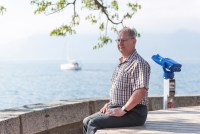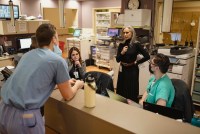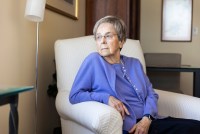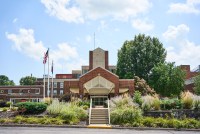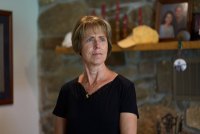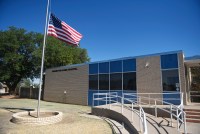He Returned to the US for His Daughter’s Wedding. He Left With a $42,000 Hospital Bill.
After emergency surgery, an American expatriate with Swiss insurance now carries the baggage of a five-figure bill. Costs for medical care in the U.S. can be two to three times the rates in other developed countries, so foreigners and expats with good insurance in their home countries need travel insurance to protect themselves from “crazy prices.”
Congressman Seeks to Plug ‘Shocking Loophole’ Exposed by KHN Investigation
A federal lawmaker has introduced a House bill that would close one of a laundry list of oversight gaps revealed in a recent KHN investigation of the system regulators use to ban fraudsters from billing government health programs, including Medicare and Medicaid.
Struggling to Survive, the First Rural Hospitals Line Up for New Federal Lifeline
Hospitals in New Mexico, Texas, and Oklahoma are among the first to apply for a new rural hospital payment model that shifts the focus of services away from overnight stays to outpatient and emergency care. Still, experts say the law needs to be amended to provide the right mix of care for rural communities.
Hospitales rurales aplican a nuevo programa federal para intentar sobrevivir
Más de 140 hospitales rurales han cerrado en todo el país desde 2010, y observadores de políticas de salud no están seguros de cuántas de las más de 1,700 instalaciones rurales elegibles para la nueva designación aplicarán a un nuevo programa.
A Bitter Battle Over the ‘Orphan Drug’ Program Leaves Patients’ Pocketbooks at Risk
Patients who depend upon special drugs to treat rare diseases are caught in the crossfire as drugmakers and the FDA battle over regulations that reward companies for developing treatments for relatively small pools of patients.
It’s ‘Telehealth vs. No Care’: Doctors Say Congress Risks Leaving Patients Vulnerable
Congress’ $1.7 trillion omnibus spending package included a two-year extension of pandemic-era funding that helped telehealth services grow nationwide. But that cash bridge, embraced by those delivering services to patients in rural areas, doesn’t provide much certainty for the future of remote medicine.
KHN Investigation: The System Feds Rely On to Stop Repeat Health Fraud Is Broken
A months-long KHN examination of the system meant to bar fraudsters from Medicaid, Medicare, and other federal health programs found gaping holes and expansive gray areas through which banned individuals slip to repeatedly bilk taxpayer-funded programs.
Buy and Bust: After Platinum Took Control of Noble Sites, Hospital Workers Were Fired
Two Missouri towns are without operating hospitals after private equity-backed Noble Health left both facilities mired in debt, lawsuits, and federal investigations. The hospitals’ new operator, Platinum Health, agreed to buy them in April for $2 and laid off the last employees in early September.
Buy and Bust: Collapse of Private Equity-Backed Rural Hospitals Mired Employees in Medical Bills
The U.S. Labor Department investigates Noble Health after former employees of its shuttered Missouri hospitals say the private equity-backed owner took money from their paychecks and then failed to fund their insurance coverage.
Rural Hospital Rescue Program Is Met With Skepticism From Administrators
A new federal rescue program that pays rural hospitals to shutter underused inpatient units and focus solely on emergency rooms and outpatient care hasn’t generated much interest yet.


